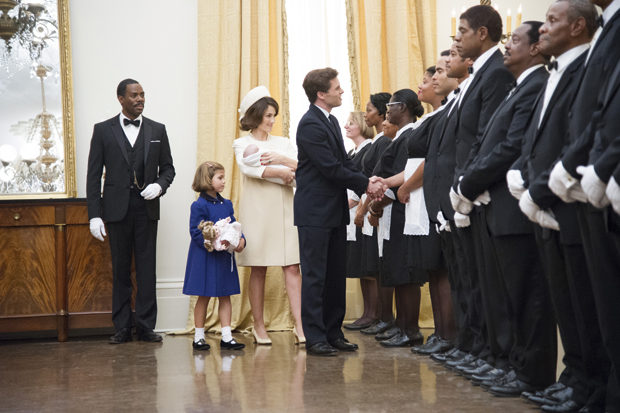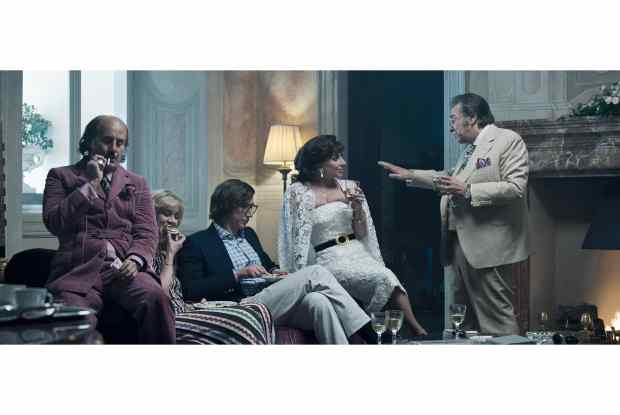The Butler tells the story of an African–American butler at the White House who served eight American presidents over three decades and it plays as a ‘greatest hits’ of the civil rights movement, along with whatever else they decided to throw in, like Vietnam, apartheid, and Lyndon B. Johnson on the can. (Actually, Lyndon B. Johnson on the can was rather the highlight.) It is heavy-handed, predictable, bland and so contrived in its sentimentality I sniggered at what should have been the moments of emotional impact. However, all was not lost, as I did have a nice little doze, which, as it was a morning screening, set me up quite nicely for the rest of the day. So there was that, but only that, alas.
Directed by Lee Daniels (Precious) in full-on melodramatic style, along with a few other styles, simply as and when — don’t know; you tell me — it stars Forest Whitaker as Cecil Gaines, a fictional character loosely based on Eugene Allen, who worked for the White House for 34 years before retiring as head butler in 1986. The story opens in Georgia, during Cecil’s boyhood, with two slave bodies swinging from a tree, lynched. Next, it is Cecil in the cotton fields, his mother (Mariah Carey, can you believe) being dragged off and raped by the white master, his father stepping up to protest, and the white master shooting him in the head.
Slavery in America was grotesque, and remains a stain upon that nation in the same way any concentration camp remains a stain upon a nation, but I am sorry to say — and I truly am, actually — that, cinematically, when all this unfolded within the first few minutes I thought: ‘Oh, that’s what this film is. It’s that kind of melodrama. We’re doing it Roots-style. Ho-hum.’
Anyway, the white master’s old mother — a trembling Vanessa Redgrave — decides to train Cecil up as a houseboy. Cecil proves an excellent servant. Having seen what happened to his father, he has learned the value of silence and unquestioning obedience. He later finds jobs in hotels, ending up, some years later, at a swish one in Washington. By this time, he is married to Gloria, as played by Oprah Winfrey (can you believe, although she does have a certain star quality), and they have two sons. He is offered the job at the White House and when he tells the family, the older son, Louis (David Oyelowo), who is sitting at the kitchen table reading a book (deep!), and has been brooding on civil-rights matters, looks daggers at him. ‘Oops,’ I thought, ‘there is going to be trouble here.’ I was not wrong.
It’s all so obvious. Louis joins the Black Panthers. Louis is there for all the newspaper headlines: the sit-ins at segregated restaurants, the torchings by the Ku Klux Klan, the assassination of Martin Luther King. Meanwhile, dad is polishing cutlery, serving drinks, buffing shoes, but is also a witness to events, in his way, as he listens into the White House conversations on all the above. Bizarrely, though, the presidents are played cartoonishly, as comic turns. There is LBJ (Liev Schreiber) on the can, and John Cusack in such a huge prosthetic nose as Nixon he’s more like Steve Martin in Roxanne. Meanwhile, Alan Rickman has the weirdest, whitest face ever as Reagan, while Jane Fonda, as Nancy Reagan, twirls coquettishly in a red skirt, and really is funny. It is tonally weird. How are we meant to care about any of the characters, or believe in them, if this sort of thing is also trotted out?
It’s a pedestrian script, with tons of exposition, tons of signalling, and jarring vernacular oddities. Would anyone have said ‘get a room’ in the 1950s, for example? Yet no one remembered to write Cecil a personality. Poor Cecil, and poor Whitaker, as there’s not much to be done with Mr Gaines. He is a passive lump in that Forrest Gump way, and never interestingly so. When Gloria goes off the rails a bit, as she does, we are meant to think it’s because her husband has neglected her for them white folks up at the White House, but you know what? I reckon that one day she sat on the end of her bed, thought, ‘God, I married a boring man,’ and then took to drink and horsing around with other fellas. And who could blame her?
The Butler does not serve its own subject matter well, and finishes with one of those clichéd, sentimental endings you can see coming from a mile off, maybe five miles off, maybe from Australia. Frustratingly, there is a decent, moving film in here somewhere; a film about Cecil’s denial and slow politicisation; a film about the quieter role of the domestic servant in winning freedoms. So there is that film, but this isn’t it.
Got something to add? Join the discussion and comment below.
Get 10 issues for just $10
Subscribe to The Spectator Australia today for the next 10 magazine issues, plus full online access, for just $10.
You might disagree with half of it, but you’ll enjoy reading all of it. Try your first month for free, then just $2 a week for the remainder of your first year.














Comments
Don't miss out
Join the conversation with other Spectator Australia readers. Subscribe to leave a comment.
SUBSCRIBEAlready a subscriber? Log in